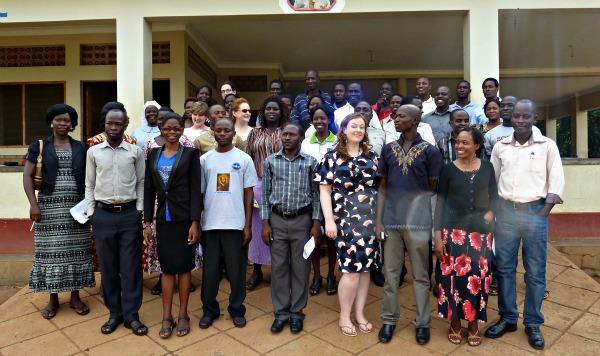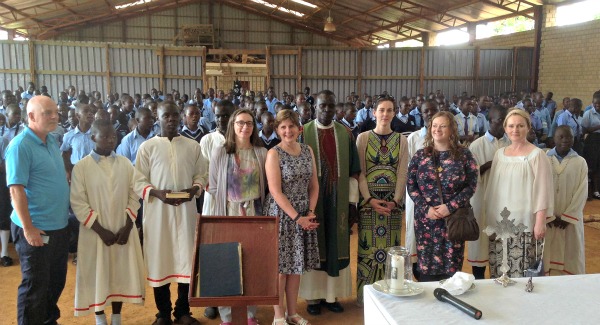
In accompaniment and solidarity
Last October, during the school mid-term break, volunteer representatives from the five Jesuit colleges in Ireland took part in a formation visit to Uganda. It is a programme in accompaniment and solidarity with colleagues in the wider Ignatian family. This is the second venture in collaboration with Ocer Campion Jesuit College, Gulu, in this calendar year led by Bríd Dunne, Irish Jesuit Missions (IJM) Development Education Coordinator. Here is her reflection.
Education is pivotal
Fr Valerian Sharima SJ, superior of the Jesuit community, proclaimed: “You people are Good News”, as we departed the Jesuit Community in Gulu after an awe-inspiring visit to Ocer. ‘Ocer’, the Acholi word for “He is Risen”, is a most appropriate title for this school.
From the ashes of 20 years of war in the region, the Jesuits of the East African Province have established a school. Now in its fifth year, Ocer is a beacon of hope for the future, and a physical sign of the risen Lord.
A co-educational boarding school set circa 7 km from the main town of Gulu, Ocer caters for up to 500 boys and girls. A major percentage of these students are supported through scholarships or bursary schemes. The 20-year war devastated the education system in the area. Because of insecurity, families were forced to leave their homes and live in internally displaced peoples’ camps. This created a culture of both dependency and fear. There was little investment in youth or infrastructure in the following years.
As the region rebuilds itself from the legacy of the Lords Resistance Army, education is pivotal to its progress. While poverty is still widespread, human resilience is tangible as families re-orientate their lives from the day-to-day survival of the displacement camps towards optimism for the future of the region. Ocer, the only Jesuit College in Uganda, is part of this regeneration.

Giving the gift of presence and time
The aim of the formation visit programme is to support staff – in both Ocer and in the five Jesuit colleges in Ireland – in expressing the global reality of Jesuit school ethos. Particular attention is paid to the Jesuit characteristic of education “the faith that does justice”. Arguably it is easier to speak about, than live this ethos. These staffs take part in a profoundly formative experience when they open themselves up to the sharing of ideas and realities. The representatives from Ireland and staff of Ocer give the gift of both presence and time to accompany one another on a journey towards greater understanding of our global human family.
A one-day seminar is facilitated, where teachers from both provinces share concepts and ideas under the umbrella of Jesuit education. The message that rings clear is that the issues are the same, but the scale is different. Every school is supporting students with personal challenges: trauma; poverty; mental health issues; gender issues; different ranges of ability. However the numbers of students affected, level of trauma, severity and resources differ greatly. Ocerians reside in the shadow of war, in a poor region, and while we can understand the statistics, meeting individuals builds our ability to empathise with their human story, and changes us as individuals. This was the experience of the Irish teachers, most especially when accompanying their colleagues in the classroom.
A story of hope and vision
Ocer is a story of hope and vision for the future. Under the leadership of Head Teacher, Br. Masereka Godfrey, it is a project in sustainability. The development of a school farm will lead to a source of food and fuel for the compound. Solar electricity harvests a natural resource to meet a need. “There is hope for the future, and for Ocer”, according to Godfrey. This collaboration between the Eastern Africa and Irish Province is a mutually beneficial programme where lay people and Society of Jesus learn from each other and are formed as a result.
Author: Bríd Dunne, Irish Jesuit Missions Development Education Coordinator, December 2015

